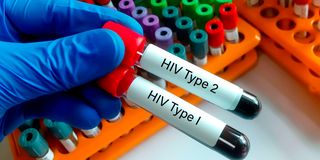Call to integrate HIV services into general healthcare system amid funding cuts

Health Cabinet Secretary Dr Deborah Mulongo says the ripple effect for funding reduction on the HIV programme will result in a projection of about 60,000 new HIV infections by 2030.
What you need to know:
- The 2021 People Living with HIV Stigma Index recommended the development of HIV disclosure guidelines to facilitate open and safe conversations in healthcare settings.
The Ministry of Health has been called upon to establish clear guidelines for the integration of HIV services into the general healthcare system.
The call by the Global Network of People Living with HIV (GNP+) comes as Kenya seeks to improve service delivery, reduce stigma and ensure sustainable access to treatment in the face of shifting global funding priorities.
Although the ministry has initiated discussions on this integration, GNP+ has identified critical gaps that require immediate attention. The organisation found that Kenya lacks two key guiding documents for a smooth transition.
First, the 2021 People Living with HIV (PLHIV) Stigma Index recommended the development of HIV disclosure guidelines to facilitate open and safe conversations in healthcare settings. Without these guidelines, people living with HIV may face difficulties in disclosing their status, which could increase the risk of stigma and inadequate care in mainstream medical services.
Secondly, the latest 2024 Stigma Index, published on March 3, highlights the need for standard procedures to guide the integration of HIV care into mainstream health services. The lack of such frameworks raises concerns about the quality and accessibility of HIV-specific services once they are integrated into broader health structures.
"The Ministry of Health in Kenya has approached us to discuss the idea of integrating HIV services into general healthcare. However, we recognise that we are missing two key documents: the first is from the 2021 PLHIV Stigma Index, which recommended that the ministry supports the development of HIV disclosure guidelines to facilitate dialogue, and the second is from the 2024 Stigma Index, launched on March 3, 2025, which strongly recommends the establishment of standard guidelines for integrating HIV into general health services," said Nelson Otuoma, chairperson of Network Empowerment of People Living with Aids in Kenya.
Kenya's initiative is part of a global trend of governments taking greater responsibility for HIV programmes as international aid declines. Countries such as India have successfully implemented a peer-led community pharmacy model that provides subsidised treatment through partnerships with governments and pharmaceutical companies. South Africa has also stepped up domestic efforts, launching large-scale treatment initiatives to improve access.
For Kenya, the success of HIV service integration will depend on a well-defined policy framework that prioritises patient-centred care. Experts warn that mainstreaming HIV services should not compromise specialised care, but instead improve accessibility, affordability and the overall patient experience. They stress that communities of people living with HIV must be actively involved in shaping these policies to ensure that their needs are adequately addressed.
“As discussions between the Ministry of Health and HIV advocacy groups progress, stakeholders stress the urgency of finalising clear guidelines and securing the necessary resources. The results of the 2024 Stigma Index are expected to play a crucial role in informing policy decisions, with further engagement expected in the coming months,” said GNP+.


